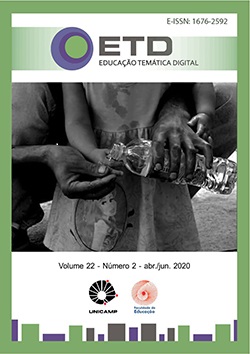Abstract
This reported experience is based on a existential comprehension of the student passing through the first periods of pedagogy course and degrees, giving the student not an arsenal of content, but the ability to critical reflection guided by philosophy, developing in it the same sense of autonomy and protagonism. It is the student who thinks his questions, neither the philosopher, nor the professor. Thus, presence activities are propose, with some in a “virtual environment”. Starting with “cretins questions” and guidance towards how to study by reading, the student is conducted through a phenomenological methodology to express his refletions based on careful observation, dialectical perspective and opening to the other. In Paulo Freire there is a native guide and in philosophy of existance there are some fundamentals. It estimulates the author expressions, be it by writing or some other language and mostly by the individualization of the topics covered in the questions of teaching, though with alternation between individual and collective tasks.
References
ANDRADE, Carlos Drummond de. A escola perfeita. In: ANDRADE. Carlos Drummond de. Histórias para o rei. 4a ed. Rio de Janeiro: Record, 1999, p.22-23.
FILOSOFIA africana. Disponível em https://filosofia-africana.weebly.com. Acesso em: 04 ago. 2018.
FILOSOFIA: um guia para felicidade. Direção Celia Lowenstein. Produção BBC, 2000, DVD.
FREIRE, Paulo. Ensinar exige estética e ética. In: FREIRE, Paulo. Pedagogia da autonomia: saberes necessários à prática docente. São Paulo: Paz e Terra, 1996.
FREIRE, Paulo. Extensão e invasão cultural. In: FREIRE, Paulo. Extensão ou comunicação. 8. ed. Rio de Janeiro: Paz e Terra, 1983. pp. 25-37.
KONDER, Leandro. Razão dialética. In: HÜHNE, Leda Miranda (Org.). Razões. Rio de Janeiro: Uape/SEAF, 1994. p. 45-66.
PENHA, João da. O que é existencialismo. 6. ed. São Paulo: Brasiliense, 1986.
PODER além da vida (Peaceful Warrior). Direção Victor Salva. Produção Sobini Filmes, 2006.
ROCHA, Ruth. Quando a escola é de vidro. In: ROCHA, Ruth. Este admirável mundo louco. São Paulo: Salamandra, 2002.
RUIZ, João Álvaro. Estudo pela leitura trabalhada. In: RUIZ, João Álvaro. Metodologia Científica: guia para eficiência nos estudos. São Paulo: Atlas, 1982. p. 34-47.
SANTOS, Milton. Deficientes cívicos. In: Brasil 500, Folha on line. Disponível em: https://www1.folha.uol.com.br/fol/brasil500/dc_3_9.htm Acesso em: 04 ago. 2018.
SUCHODOLSK, Bogdan. Educação voltada para o futuro e a perspectiva de um sistema social à escala humana. In: GADOTTI, Moacir. História das ideias pedagógicas. São Paulo: Ática, 2003.
The ETD - Digital Thematic Education uses the Creative Commons license (CC), thus preserving the integrity of the articles in an open access environment.


